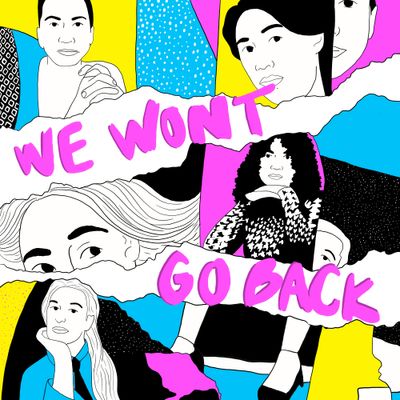
The Supreme Court’s overturning of Roe v. Wade last month marked a seismic moment in politics and culture that has affected everyone, and the world of pop music is no exception. Musicians started responding immediately, from Cher to Olivia Rodrigo, on social media, at their shows, and in their music. One artist who wasted no time criticizing the Dobbs decision is singer-songwriter Connie Lim, a.k.a. MILCK. Her song “We Won’t Go Back,” composed with Biianco, Autumn Rowe, and Ani DiFranco, came about after Politico published an article in May with the leaked draft that told the world in no uncertain terms that the Supreme Court was revoking the constitutional right to an abortion.
On the latest episode of Switched on Pop, MILCK deconstructs “We Won’t Go Back” with hosts Nate Sloan and Reanna Cruz and discusses how musicians are responding to the fall of Roe. You can read an excerpt from that conversation below. Later in the show, they’re joined by the critic Ann Powers, who has been chronicling the reactions in a running list at NPR.
Nate Sloan: When did you know that protest chants had to be part of a song?
I was filming [abortion-access protests] and just fully in it. There’s some chants at protests that sometimes I’m like, Eh, I’m not really feeling that one, but this one — We won’t go back — just felt really true. The shout just hurled out of my own lungs.
I went back to my hotel room, looked at the footage again, and immediately the idea came to me: This could be a song. It just feels really true amid all of the news. We won’t go back. That’s when the song just kind of just zoomed through me. It was one of those things where I was fumbling really quickly to set up my recording gear, put down the drum samples and then sample the audio of the protest. It was one of those visceral, quick births of a song.
What do those four words mean to you in this context?
We won’t go back means so much. I’m thinking of this group called the Jane Collective, a group of women that provided abortions before abortions were legal. I think about the women, men, and nonbinary people who have done a lot of work through organizations like Planned Parenthood — who have passed away and now they’re fairly spinning in their graves. That’s who I think about when I think about “We Won’t Go Back.”
The other layer is the tremendous sadness I feel. I’m still hopeful, because I see the amount of micro movements that are happening now; people are like, Okay, well, we’re gonna be the people that send care packages to people who are traveling across states to get abortions. And I was thinking, Is this what happened in the past, too?
You described the drums on this track as “rageful.” And when I hear your voice enter the song at the very beginning, it has an effect on it, a sort of overdrive, to make it sound a little grittier and tenser.
Those lyrics, the grittiness and chunkiness of the instrumentation, it’s almost like an unapologetic way of taking up space, right? It’s cathartic. I think the status quo really benefits from women and nonbinary people being disassociated from their rage, and I am a product of that. When things happen that are infuriating, I don’t feel the rage like other people do; I have centuries of conditioning in my genetics.
That’s a good skill of mine, but I also struggle with it at times because I watch other people be able to be angry. And I think it’s really healthy that the music helps me tap into it. Because if I don’t address my rage, it becomes a toxin. If I can tap into my rage, I can acknowledge it. Then I can move forward and go toward pleasurable things. Music is kind of rage and pleasure at the same time, which I think is really healthy because it will keep me energized in this fight.

